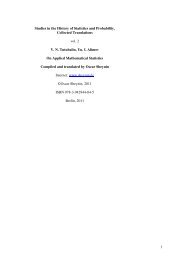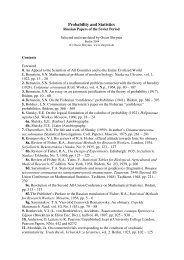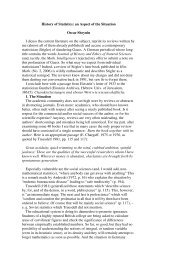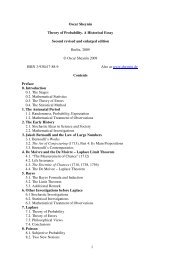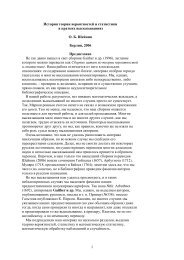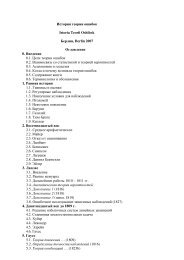one on another, as well as the corresponding tool of n-dimensional Stieltjes integrals, <strong>and</strong> healso essentially supplemented {the theory of} limit theorems.In our time, the Chebyshev, Markov <strong>and</strong> Liapunov direction outlined above culminated inBernstein’s investigations (1925 – 1926) who was the first to prove the mainmultidimensional limit theorem <strong>and</strong> to provide the most thorough <strong>and</strong> deep study ofsequences of dependent variables.Recalling that mechanics does not restrict its objects by considering systems of a finitenumber of material points, it would have certainly been unnatural to suppose that the theoryof probability will not go beyond the patterns that only study a finite number of r<strong>and</strong>omvariables. Excluding Bachelier (1900), who remained misunderstood, not puremathematicians but physicists (Smoluchowski, Fokker, Planck), biologists (Fisher) 1 ,actuaries (Lundberg) <strong>and</strong> those applying statistics to technology (Fry) originated widerinvestigations. All their studies may be regarded as particular cases of a general theory ofstochastic processes, that is, of a general theory of r<strong>and</strong>om changes of the states of somesystem in time.Already when the state of a studied system is determined at each given moment t by thecorresponding value of a single parameter x, this latter, if understood as a function x(t) oftime, provides an example of a r<strong>and</strong>om function. Other applications of such functions are yetvery little developed, but it seems likely that they ought to be very numerous <strong>and</strong> important,in particular for the theory of r<strong>and</strong>om oscillations, for the construction of a statistical theoryof turbulence <strong>and</strong> in quantum physics. In all these applications, the state of a system at eachgiven moment is described by some function of a certain number of arguments; <strong>and</strong>, since thevery state of the system is r<strong>and</strong>om, we deal with some r<strong>and</strong>om function already at each fixedt.The study of r<strong>and</strong>om functions <strong>and</strong>, therefore, of distributions in functional spaces,inevitably leads to a certain revision of the axiomatic basis of the theory of probability. Asufficiently general axiomatic exposition of the fundamentals of the theory, satisfying all therequirements of modern physics <strong>and</strong> other applied fields, was created during the last decade.The guiding principle of a considerable part of the pertinent studies was, however, not thedesire to cover a wide range of new applications going beyond the old boundaries, but thewish to trace, in all their generality, the recently discovered deep similarities between anumber of notions of the theory of probability <strong>and</strong> the metric theory of functions of a realvariable.The formulation of new problems led also to the creation of new analytic tools, such as,first, integral, differential <strong>and</strong> integro-differential equations of stochastic processes thatoriginated as a generalization of the Smoluchowski integral equation <strong>and</strong> the Fokker – Planckdifferential equation. And the second side of the new machinery should be the still very littledeveloped theory of characteristic functions <strong>and</strong> moments for distributions in infinitedimensional(in particular, in functional) spaces. We note in concluding that the differential<strong>and</strong> integro-differential equations of stochastic processes led to the construction of a verypowerful method for proving limit theorems which directly adjoin the studies of theChebyshev direction.We can now systematize the new currents in the theory of probability which is the aim ofmy report.1) Investigations that originated owing to the analogy with the metric theory of functionsof a real variable.a) The general axiomatics of the theory of probability (Borel, Fréchet, Kolmogorov,Hopf).b) Research connected with the law of large numbers (Borel, Cantelli, Slutsky, Fréchet,Khinchin, Kolmogorov, Glivenko, Lévy).2) New patterns created owing to the physical <strong>and</strong> other applied issues.
a) The theory of stochastic processes (Finetti, Hostinsky, Hadamard, Mises, Kolmogorov,Fréchet, Khinchin, Lévy).b) The theory of r<strong>and</strong>om functions (Wiener, Slutsky, Lévy).3) New analytic toolsa) Equations of stochastic processes (Kolmogorov, Hostinsky, Fréchet, Bernstein,Pontriagin).b) Characteristic functions <strong>and</strong> moments in infinite-dimensional <strong>and</strong> functional spaces(Khinchin).c) New methods of proving limit theorems (Kolmogorov, Petrovsky, Bernstein, Khinchin,Bavli).1a. As stated above, all the problems of probability theory considered up to the lastdecades can be reduced to the study of a finite number of r<strong>and</strong>om variables. All theprobabilities encountered here will be determined if we provide an n-dimensional distributionfunction of these variables. In particular, Mises, in his course in the theory of probability(1931), systematically kept to the mentioned restriction. In his terminology, this wasexpressed by assuming that the set of indications (Merkmalmenge) of an arbitrary collectivewas always a set of points of an n-dimensional space.It is the most natural to perceive a distribution function in an n-dimensional space as anadditive function in a domain of that space. The mathematical interpretation of a problem inthe theory of probability of the indicated classical type depends exclusively on thecorresponding distribution function. Therefore, if the only aim of the axiomatic theory ofprobability is the most compact <strong>and</strong> clear enumeration of the logical assumptions ofsubsequent mathematical constructions, then, when dealing with problems of the classicaltype, it would be simplest to select directly as the axioms the characteristic properties ofdistribution functions (non-negativity; additivity; <strong>and</strong> their being equal to 1 for the completespace). According to my deep conviction, the axiomatics of probability theory cannot haveany other goals because the question about the applicability of a given mathematical patternto some concrete physical phenomena cannot in essence be solved by the axiomatic method.Mises’ attempt clearly illustrates this idea. To confine his construction within the boundariesof fixed axioms, he is compelled only to postulate the approach of the frequencies to certainlimits as the trials are unboundedly continued, without saying anything about when,beginning with what finite number of repetitions, may we conclude that the formerpractically coincide with the latter. Indeed, an answer to this question can only be providedafter going beyond the boundaries of a rigorously formal mathematical thinking. Thus, theMises axioms, irrespective of the connected intrinsic difficulties, are, one the one h<strong>and</strong>, notneeded for justifying the mathematical theory, <strong>and</strong> insufficient for substantiating itsapplicability on the other h<strong>and</strong>.My system of axioms [1] is a direct generalization of the properties of distributionfunctions listed above. This generalization allows us to cover all those new non-classicalproblems described in the Introduction. I only indicate here one point concerning theaxiomatic construction of the main notions of the theory of probability, – that point, which,as it seems to me, still requires to be developed.In the applications, researchers often consider conditional probabilities which aredetermined under the restriction that some r<strong>and</strong>om variable x took a definite particular valuex = a. If x has a continuous law of distribution, the elementary method of determining theconditional probability P x=a (A) of event A given that x = a,P x=a (A) = P(A|x = a)/P(x = a),
- Page 4 and 5: [3] I bear in mind the well-known p
- Page 6 and 7: successes of physical statistics. B
- Page 8 and 9: classes of independent facts whose
- Page 10 and 11: distribution is a corollary of the
- Page 12 and 13: examine in the first place the curv
- Page 14 and 15: 12. According to Bortkiewicz’ ter
- Page 16 and 17: generality, the similarities taking
- Page 20 and 21: is inapplicable because the right s
- Page 22 and 23: Instead, Slutsky introduced new not
- Page 24 and 25: abandoned in August 1936, but it is
- Page 26 and 27: last decades, mathematicians more o
- Page 28 and 29: charged with making the leading ple
- Page 30 and 31: motion and a number of others) are
- Page 32 and 33: phenomena. It is self-evident that
- Page 34 and 35: Such new demands were formulated in
- Page 36 and 37: The addition of independent random
- Page 38 and 39: automatic lathes, etc. Here, the ma
- Page 40 and 41: 11. Kolmogorov, A.N. Grundbegriffe
- Page 42 and 43: period 1 and remained, until the ap
- Page 44 and 45: of the analytical tool rather than
- Page 46 and 47: with probability approaching unity,
- Page 48 and 49: logic. The ensuing vagueness in his
- Page 50 and 51: 2. Gnedenko, B.V. (1949), On Lobach
- Page 52 and 53: will be sufficient, although not ne
- Page 54 and 55: nlimk = 1P(| k (n) - m k (n) | > H
- Page 56 and 57: favorite classical issue as the gam
- Page 58 and 59: and some quite definite (not depend
- Page 60 and 61: influenced by a construction that a
- Page 62 and 63: P ij (1) = p ij (1) , P ij (t) =kP
- Page 64 and 65: 4.2d. Bebutov [1; 2] as well as Kry
- Page 66 and 67: are yet no limit theorems correspon
- Page 68 and 69:
described, from the viewpoint that
- Page 70 and 71:
conditional variance and determined
- Page 72 and 73:
Romanovsky [45] and Kolmogorov [46]
- Page 74 and 75:
Let S be the general population wit
- Page 76 and 77:
Part 1. Russian/Soviet AuthorsAmbar
- Page 78 and 79:
2. On necessary and sufficient cond
- Page 80 and 81:
Gnedenko, B.V., Groshev, A.V. 1. On
- Page 82 and 83:
52. ( (Mathematical Principl
- Page 84 and 85:
Kozuliaev, P.A. 1. Sur la répartit
- Page 86 and 87:
Obukhov, A.M. 1. Normal correlation
- Page 88 and 89:
30. Généralisations d’un théor
- Page 90 and 91:
22. Alcune applicazioni dei coeffic
- Page 92 and 93:
10. A.N. Kolmogorov. The Theory of
- Page 94 and 95:
Kuznetsov, Stratonovich & Tikhonov
- Page 96 and 97:
In the homogeneous case H s t = H t
- Page 98 and 99:
to such a generalization. He only s
- Page 100 and 101:
In the particular case of a charact
- Page 102 and 103:
as it is usual for the modern theor
- Page 104 and 105:
1. {The second reference to Pugache
- Page 106 and 107:
Smirnov, Romanovsky and others made
- Page 108 and 109:
determined the precise asymptotic c
- Page 110 and 111:
for finite values of N, M and R 2 .
- Page 112 and 113:
Mikhalevich’s findings by far exc
- Page 114 and 115:
Uch. Zap. = Uchenye ZapiskiUkr = Uk
- Page 116 and 117:
Khinchin, A.Ya. 43. Math. Ann. 101,
- Page 118 and 119:
7. DAN 115, 1957, 49 - 52.Pinsker,
- Page 120 and 121:
Anderson, T.W., Darling, D.A. (1952
- Page 122 and 123:
Statistical problems in radio engin
- Page 124 and 125:
observations for its power with reg
- Page 126 and 127:
securing against mistakes (A.N. Kry
- Page 128 and 129:
of the others, then its distributio
- Page 130 and 131:
In Kiev, in the 1930s, N.M. Krylov



